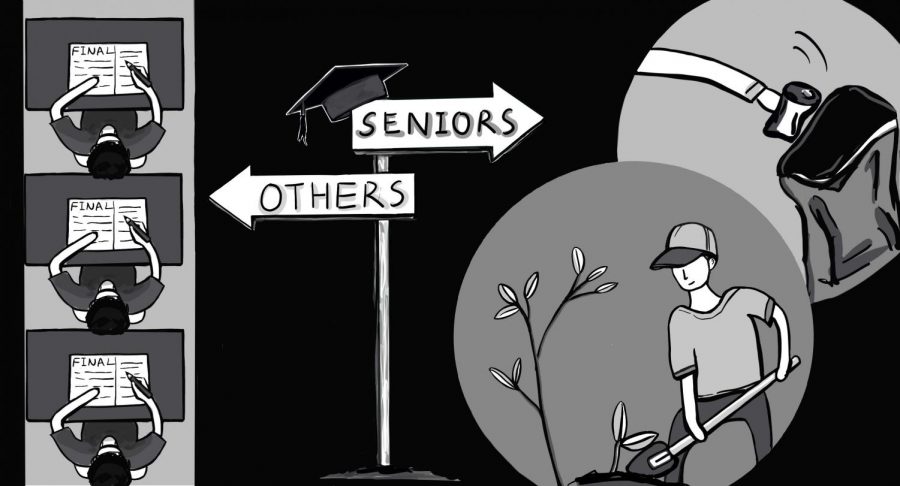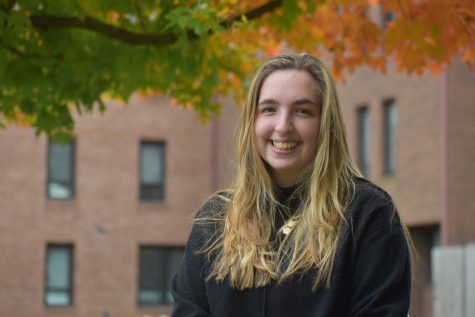Senior service may replace finals
Executive Committee passed a bill that would replace senior finals with 15-20 hours of community service. The proposal is now under review of the academic advisory committee.
February 25, 2020
By a margin of 16-7, Executive Committee passed a bill that would require seniors to participate in 15 to 20 hours of compulsory community service projects in place of final exams. The passed bill must now be presented to department chairs and members of the administration before finally being reviewed by the Academic Advisory Committee.
While the bill garnered overwhelming support as evidenced by the Executive Committee vote and was written with the intent of bringing the senior class together through group volunteer work, members of the faculty have shared concerns as to the proposal’s potential to be successfully enacted.
The bill was co-sponsored by senior class president Michelle Wei and sophomore class MISH representative Patrick Curnin-Shane, both of whom expressed a desire for a more meaningful experience to culminate the seniors’ final days at Masters. The bill’s statement of rationale asserts that, “Aside from senior transition day, there is no collective senior experience to end their high school experience. Moreover, finals can cause excessive stress for seniors who are already preparing for change.”
Curnin-Shane said he feels that the collective experience of giving back through community work will foster greater connections between seniors as graduation nears.
“I really hope that people take advantage of this opportunity to do community service and build community within the senior grade because it’s unclear a lot of the time, besides a grade-wide trip or a MISH project, as to when the grade actually gets together and works together,” he said.
At present, most seniors take very few finals, if any at all. Those enrolled in AP courses or semester-long courses and language seminars aren’t given any final exams in those classes. There still remains the question, however, of whether or not seniors in courses that consist of students in different grades will be expected to take final exams.
A subcommittee, to be led by both the bill’s co-sponsors and Head of Upper School Peter Newcomb, has been formed to further clarify and outline the mechanics of the bill, yet this lack of clarity is what Richard Simon, chair of the Modern and Classical Language Department foresees as motivating possible concerns from his department.
Simon explained, “I worry about what the dynamic would be like if say we’re in a level four language course and half the class is made up of juniors and half is seniors, when the review period starts, the seniors are now just delirious with joy, not doing anything, not focusing on the course, while the juniors are really sweating every minute in class and trying to make sure they’re ready for the final exam,”
Currently, the graduation requirement, as it relates to the Language Department, stipulates that one must complete at least three years of a foreign language or must complete the first three levels of the course. It remains unclear whether or not a senior in a level three language course would need to complete the final exam in order to meet graduation requirements under the new bill.
Additionally, for Simon, the final exam lends the course a sense of completion and reflection that is beneficial to a student’s educational experience.
Dean of Faculty Sam Savage foresees concerns from faculty members who, like Simon, see final exams as educational tools.
“Based on my previous experience, a critical piece of the discussion that would happen at the faculty level is a discussion of what we believe is the value of the exams that we offer and what is the value of this new opportunity and how would we value one against the other.”
Despite the proposal’s passing in Executive Committee, it requires approval from Academic Committee to be officially enacted. Savage, who acts as Chair of the Academic Committee, remains in support of the proposal’s aims but holds reservations as to whether or not the proposed community service requirement considers the personal needs of all students.
“If you look at the fact that the proposal is for 15-20 hours of community service, there’s just an equity piece when considering what this looks like for a day student and what it looks like for a boarding student. We should try to make sure that this presents as an exciting opportunity for everybody,” he said.
If a community service requirement were to be adopted, the proposal indicates that it would be the responsibility of the class dean to record and keep track of each student’s completed hours. Dean to the class of 2021, Eric Shear, sees less of an issue in the actual tracking of community service, but rather in the value of compulsory community service.
“I think it’s feasible, it’s definitely not impossible. However, I think it should be something that isn’t compulsory because I don’t want kids doing community service because they feel like they have to, I want them doing it because they’re excited about it and it’s something they enjoy,” he said.
Shear also said he feels that charging the class deans with the responsibility of tracking their students’ community service hours would change interactions between the seniors and their class dean.
He said, “You’re asking in a lot of ways for the relationship between the seniors and the class dean to be strained at the end of the year, when you have the class dean chasing down seniors and saying ‘You have to go help people.’”
In her 22 years of teaching at Masters, chair of the Math Department Michele Dennis has seen Executive Committee proposals aimed at eliminating senior finals fail to pass the Academic Committee several times. Her reservations relate to the value of final exams in math courses.
“My major concern is that the final exam is a way to really tie together all the concepts from the whole year, and I don’t think most students realize that when they [seniors] have to go take a math placement test in college they are going to have appreciated that review.”
English teacher Miriam Emery is a faculty representative on Executive Committee, who served on the Faculty Advisory Board in years past. She chose to vote in favor of the proposal in the hopes of supporting a more enjoyable senior experience at the end of the school year.
“Ideally, the year would culminate with what is often called the ‘peak-end experience’ or a memorable end experience. That is one reason that in ninth grade I have my students perform Shakespeare scenes, which definitely is not everyone’s favorite thing, but for most students it is a good end of the year, just something that they’re doing together and enjoying,” she said.




